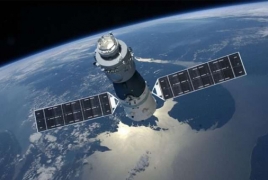Up to 100kg parts of Chinese space station may crash down on Earth October 18, 2017 - 14:22 AMT PanARMENIAN.Net - An 8.5-tonne Chinese space station has accelerated its out-of-control descent towards Earth and is expected to crash to the surface within a few months, The Guardian says. The Tiangong-1 or “Heavenly Palace” lab was launched in 2011 and described as a “potent political symbol” of China, part of an ambitious scientific push to turn China into a space superpower. It was used for both manned and unmanned missions and visited by China’s first female astronaut, Liu Yang, in 2012. But in 2016, after months of speculation, Chinese officials confirmed they had lost control of the space station and it would crash to Earth in 2017 or 2018. China’s space agency has since notified the UN that it expects Tiangong-1 to come down between October 2017 and April 2018. Since then the station’s orbit has been steadily decaying. In recent weeks it has dipped into more dense reaches of Earth’s atmosphere and started falling faster. “Now that [its] perigee is below 300km and it is in denser atmosphere, the rate of decay is getting higher,” said Jonathan McDowell, a renowned astrophysicist from Harvard University and a space industry enthusiast. “I expect it will come down a few months from now – late 2017 or early 2018.” Although much of the craft is expected to burn up in the atmosphere, McDowell says some parts might still weigh up to 100kg when they crash into the Earth’s surface. The chance that anyone will be harmed by the debris is considered remote but China told the United Nations “Committee on the Peaceful Uses of Outer Space” in May that it would carefully monitor the craft’s descent and inform the United Nations when it begins its final plunge. Predicting where it is going to come down would be impossible even in the days ahead of its landing, McDowell said. “You really can’t steer these things,” he said in 2016. “Even a couple of days before it re-enters we probably won’t know better than six or seven hours, plus or minus, when it’s going to come down. Not knowing when it’s going to come down translates as not knowing where it’s going to come down.” Yerevan will host the 2024 edition of the World Congress On Information Technology (WCIT). Rustam Badasyan said due to the lack of such regulation, the state budget is deprived of VAT revenues. Krisp’s smart noise suppression tech silences ambient sounds and isolates your voice for calls. Gurgen Khachatryan claimed that the "illegalities have been taking place in 2020." Partner news |